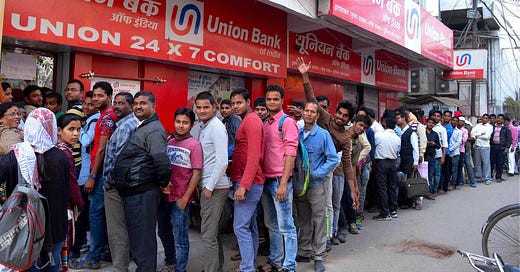If you’re reading this, you’ve definitely spent at least an hour standing in a queue outside a bank or ATM in November 2016 - thanks to demonetisation of the 500 and 1000-rupees notes by our government.
People were standing in queues for long hours, fighting to exchange their own hard-earned money! The whole process was frustrating, to say the least (I don’t know why the dude in the brown t-shirt looks so happy though) 😛
Anyway, 2 days ago, RBI came up with another bomb - that the Rs. 2,000 note will be removed from circulation.
But is this demonetisation?
And how does it affect us?
Let’s find out..
First, what’s happening with the 2000-rupee note?
You see, the primary reason the 2000-rupee note was introduced in 2016 was because 500 and 1000-rupee notes were being demonetised.
Now, RBI has a “Clean note policy”, according to which torn and soiled notes should be removed from circulation and should be replaced with fresh notes.
So in line with the policy, and because most of the 2000-rupee notes have already served their lifespan of 4-5 years (and are no longer required), RBI has decided that it will remove these notes from circulation.
And people who have these notes can get it exchanged from banks till 30th September.
Is this demonetisation though?
Not at all.
The whole point of demonetisation in 2016 was to remove black money from the economy. This is more of an operational decision, where the 2000-rupee notes have served their purpose and are now being discontinued.
The note is still valid as legal tender. This means it will still legally be accepted everywhere. RBI has just asked banks to stop circulating it (RBI had stopped printing these notes in 2018-19 anyway).
However, there’s a caveat - there is no mention of how long the notes will be accepted as legal tender. And the RBI circular says that these instructions are valid till 30th September.
So there may be a possibility that people, in general, may not accept the 2000-rupee notes. Which is why, if you have them, in all probability, you’ll have to get it exchanged at the bank only (or certain designated RBI offices)
So, what can you do now?
Well, if you hold a few 2000-rupee notes, you can:
Get it exchanged it from any bank branch. The maximum limit for exchange is Rs. 20,000
Deposit it in your bank account. On deposits, there’s no specific limit - it basically depends on the limit of your account as per your KYC
Exchange at BC outlets. You can go to any Business Correspondent agent of the bank and get your notes exchanged. The maximum limit here though is Rs. 4,000
Now, how does this impact us?
Apart from the pain of standing in queues, you mean?
Haha, just kidding. Personally, I don’t think there’s going to be so much hue and cry. And I’ll tell you why:
The 2000-rupee notes are just 10.8% of the total currency in circulation. In 2016, 500 and 1000-rupee notes formed 86% of the currency in circulation. So the impact this time will be fairly low
We still have time till 30th September to get this exchange done. And till then, these notes are legally valid. So there will no rush to get rid of these notes; it can happen at ease.
But how does this impact the economy?
Well, couple of interesting things can come up with this:
For folks with black money, the cash will go towards buying assets like gold and real estate. So we may see prices for gold and real estate increase in the near future.
This price rise, however, will most probably be in pockets and very localised.
Since the maximum limit for exchange is Rs. 20,000, a lot of people may want to deposit the money in their bank account instead of exchanging it. Now, totally, the worth of these 2000-rupee notes is 3.26 lakh crores. And if we assume 50% of this to be deposited (just a guesstimate), that’s 1.61 lakh crores worth of additional money infused with banks.
This additional money means there will be additional capital with banks. Now since they have more money, they may want to lend it at cheaper rates, bringing down interest rates again. We saw something similar happen during the 2016 demonetisation. But given the lower scale and lower impact, we can’t be 100% sure of this.
I had to buy a pair of spectacles for my parents yesterday, so I went to Mr Bansal’s Lenskart store, where I had a really interesting conversation. The store manager said that ever since the RBI declaration, he’s started getting hoards of customers who are paying in 2000-rupee notes. He showed me the cash he had collected just yesterday, and said it’s probably the highest he’s seen!
I was told that even malls, Dmart etc were packed to capacity, with people paying in cash (primarily 2000-rupee notes). So while there’s no data here, anecdotal evidence suggests that maybe retail sales could also see a rise in numbers.
But like I said, there’s no data for the last point. So let’s just wait and watch!
I work in fintech, so I don’t carry cash at all, leave aside 2000-rupee notes 😂
What about you though? Do you have any 2000-rupee notes that you’re trying to exchange? Tell me your experience! I’d love to write about it on my LinkedIn
Also, please share this post with friends who you think need to know about this!
PS: For some of you, this email may have gone in the “promotions” tab in Gmail. Please drag it to Primary and click on “YES” when Gmail asks “Do this for future messages from bizfin.substack.com?” Else you may end up missing the email!




